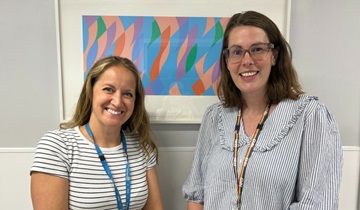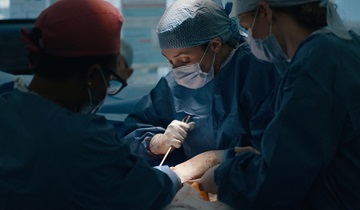Netflix's Critical documentary: meet our major trauma psychology team
To mark the launch of Netflix's new documentary series Critical: Between Life and Death, which features staff from our major trauma team at St Mary's Hospital, we spoke to Dr Katy Bowen. Katy tells us about her role as lead clinical psychologist in the major trauma psychology team, how her mum’s time in hospital inspired her career choice, and the importance of caring for the mind as well as the body.
What inspired you to work in this field?
I’ve always wanted to work in a role where I could support people who have gone through difficult experiences. I think this came from when my mum was in hospital when I was a teenager. She was really unwell, and I remember being so grateful to everyone working so hard to help her. I wanted to be able to give that same kindness and care to other people. At the same time, I had a mentor in secondary school who provided a space for me to share what was going on. The support he gave me made a huge difference and also had a big role in my career choice. I knew that this was something I wanted to offer other people.
Dr Katy Bowen
"I love working in a busy hospital with incredibly skilled medical professionals – it feels energising and like we’re making a difference to our patients’ lives."
I first started working with adolescents in the criminal justice system as part of my PhD and then moved into supporting people in secure psychological services. I most enjoyed working in physical health and broad trauma services, both in hospital and school settings, where I saw how much of a difference I could make helping people through adversity. I joined the Trust in 2023 to help form the major trauma psychology team, which brings together the different elements of my career to date.
I love how every day is different in major trauma. You never know who you will meet on the ward and the life stories I hear are fascinating. I also love working in a busy hospital with incredibly skilled medical professionals – it feels energising and like we’re making a difference to our patients’ lives.

Tell us about the major trauma psychology team and your role.
We are a team of clinical psychologists within the major trauma centre at St Mary’s Hospital. We support the adult and paediatric major trauma wards, providing psychological assessment and care for patients and families. We also proactively follow-up when patients are discharged from hospital, giving patients access to psychological assessment and care when they go home.
We provide training and support to the wider major trauma staff team, as well as a coordinated psychological response for patients coming to our hospital in the event of a major incident. My role as joint team lead alongside Dr Helen Devonshire is providing strategic planning, service development, and providing clinical expertise.
The patients we see have suffered serious, sometimes life-threatening, physical injuries. They often also face significant psychological trauma – in relation to the accident itself, their injuries and sometimes due to the stress of going through intrusive procedures and gruelling rehab while in hospital. It’s our job to help patients come to terms with what’s happened and then support them to rebuild their lives.
Every patient is different but returning home after a stay in hospital can be overwhelming, scary and require a lot of adjustment, which is why it’s so important that our role extends outside the hospital. It’s really inspiring seeing how patients find a new strength and resilience, in themselves and from their support networks, to start a new chapter in their lives.
How did this team come about and how does it fit into the London major trauma network?
Our team came together in 2023 as part of a two-year NHS pilot to introduce psychology teams at each of London’s four major trauma centres, which are each key parts of the wider major trauma network.
The need for this is clear. Between 30 – 40 per cent of people who undergo major traumatic injury report serious, long-term psychological disorders.* Studies have shown that up to 35 per cent of trauma patients are not returning or making an incomplete return to work.** We want to change this through early identification and prevention, ensuring major trauma patients get the psychological support they need at the right time.
We’re well into the second full year of the pilot, which is funded by the NHS England London Violence Reduction Programme, and we are seeing huge benefits with expanded mental health support for patients and staff. It’s also improved the resilience of the NHS in London and our ability to step up support in the event of a major incident in the capital, such as a natural disaster or terrorist attack.
How has the psychology team helped patients and staff?
Over the last two years our team has grown from one part-time member of staff to a nine-person paediatric and adult psychology major trauma team. This has enabled us to develop our service offering, so we can help more people, which I am incredibly proud of.
Our team has had tremendous impact. In 2024/25 alone, we supported over 1,200 patients and families at St Mary’s. This includes a wide range of patients with different challenges – patients who have faced domestic violence, struggled with flashbacks, or found it hard to engage with medical care. In addition, we’ve identified and supported patients who needed ongoing therapeutic support as outpatients, including those with mental health difficulties such as post-traumatic stress disorder (PTSD), adjustment difficulties, and pain management. We have also provided training to our colleagues, focused on enhancing the care they provide with psychological perspective, as well as supporting their own wellbeing.

I felt really proud watching Critical. It really brought home how I’m part of one amazing NHS team. It's incredibly powerful seeing so many different professionals coming together across the network to save lives and I’m really pleased at how strongly patient voices come through in the episodes – they’re the reason we do what we do.
I think it’s important that the public sees this too and knows that the NHS will be there for them when they need it. It’s completely normal to find things challenging after having a complex injury, and I hope there will be increasing awareness that there is psychological support available.
How do you switch off from work?
Having a very active toddler means I have no choice but to switch off when I’m home! I need eyes everywhere! I love pushing him on the swings, seeing him happy and excited. Toddler cuddles are the best (and most chaotic!). Looking after myself is essential too, and I notice my stress levels increasing when I don’t prioritise this. My favourite way to de-stress is to lie in my hammock, with my cat on my lap, reading a book in the sun. Going running or rowing and being in nature is also another way I feel calm and happy.
- Feeling inspired? Start your career at our Trust.
- Watch the trailer for Netflix's Critical: Between Life and Death
References
*Prevalence of depression and posttraumatic stress disorder after acute orthopaedic trauma: a systematic review and meta-analysis.
**A study of outcomes of patients treated at a UK major trauma centre for moderate or severe injuries one to three years after injury.
